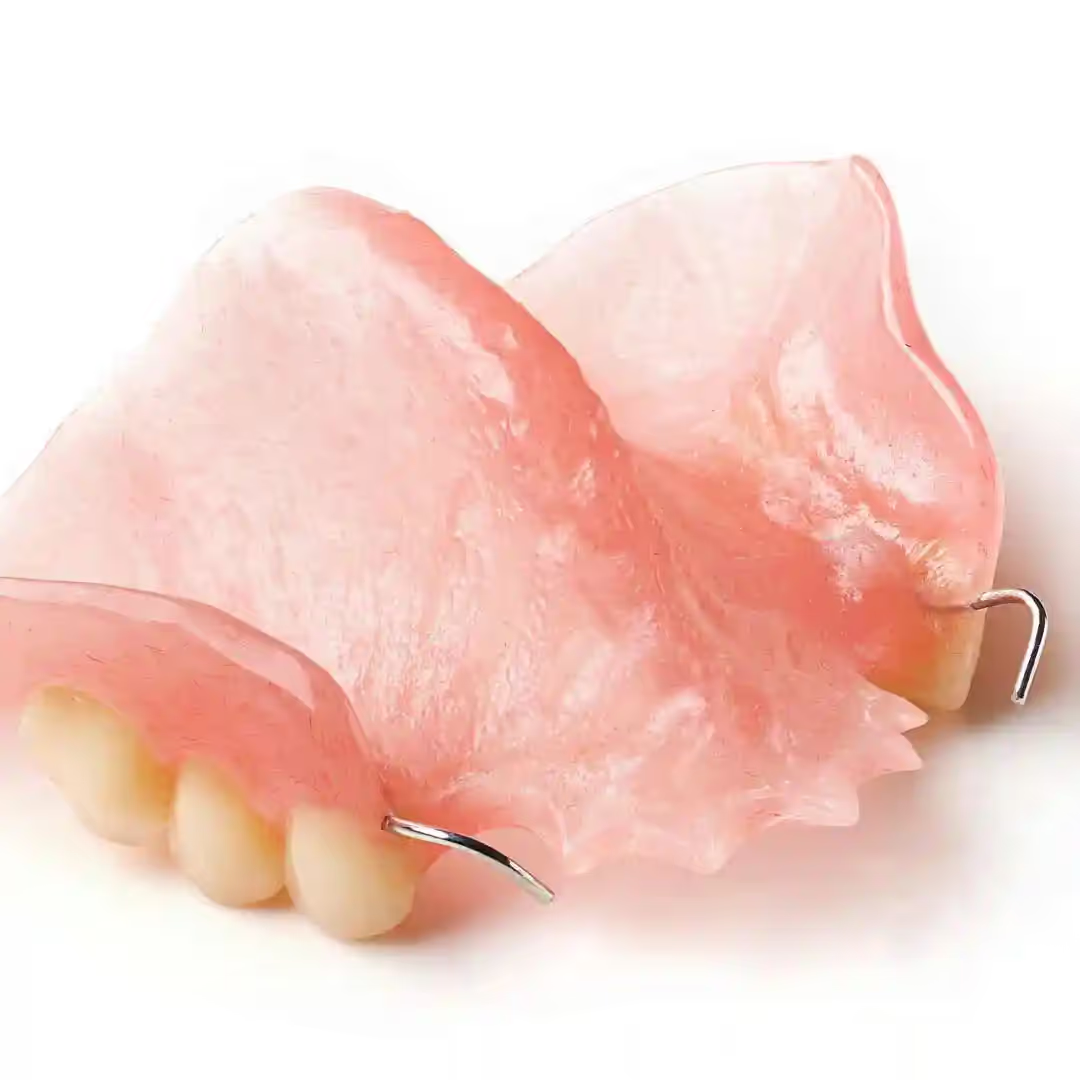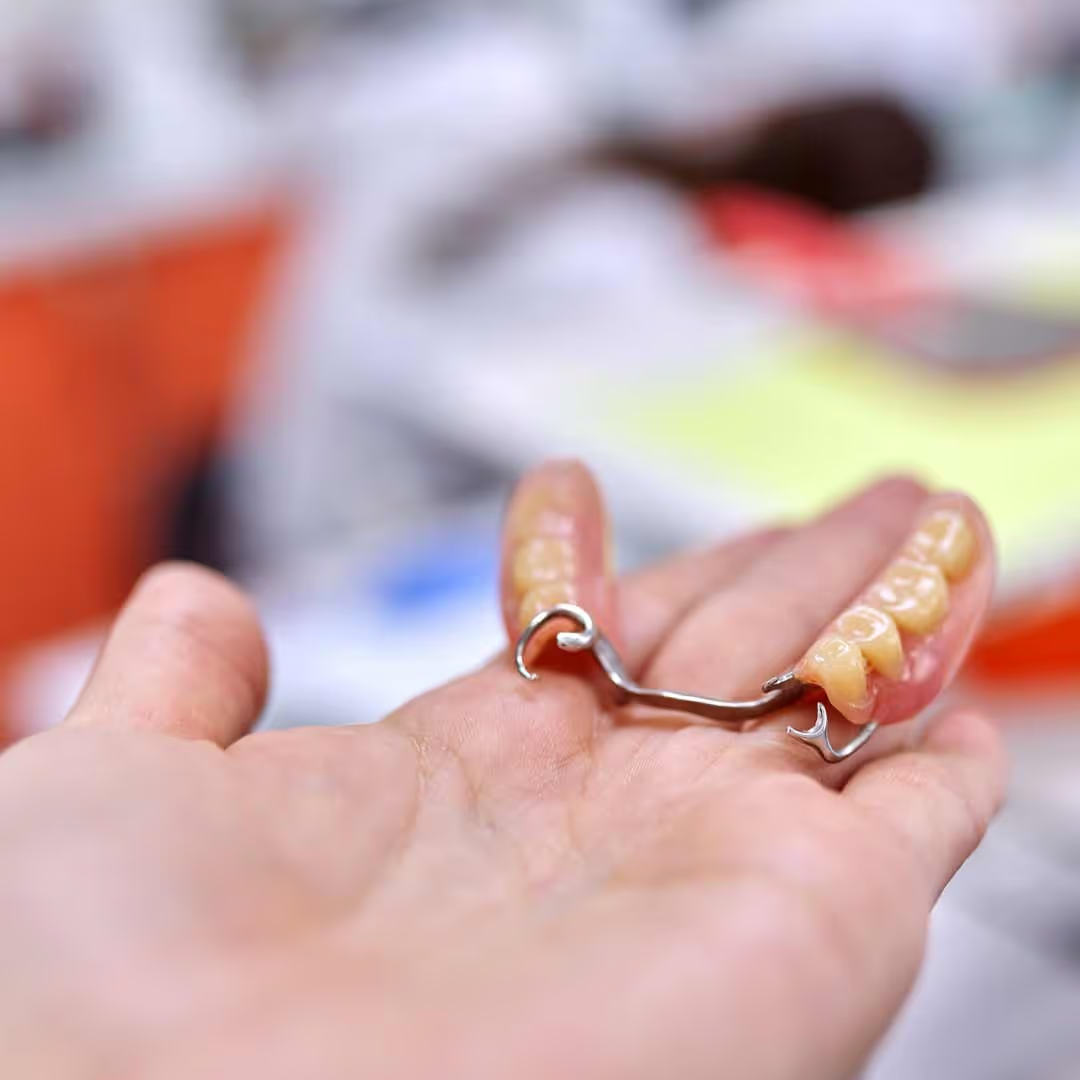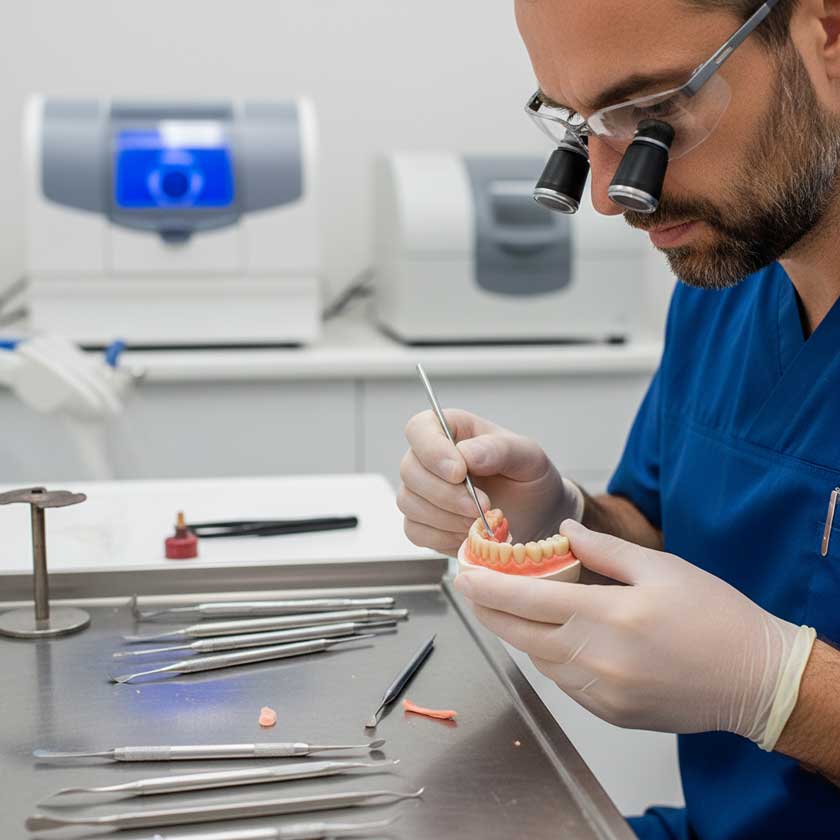Wondering how much partial dentures might cost you and what factors can influence these prices? This article breaks down the various elements that affect partial denture prices, including materials, procedures, and geographical location. Read on to get a clearer picture and make informed decisions for your dental health.
Key Takeaways
- Partial dentures come in various types, including removable and fixed options, made from materials such as acrylic, metal, and flexible nylon thermoplastic. Each has its own pros and cons regarding price, durability, and comfort.
- Several factors influence the cost of partial dentures, including the chosen materials, the complexity of necessary dental procedures, and the dentist’s expertise and location, with prices generally ranging from $800 to $3,100.
- To manage the cost of partial dentures, patients can explore various payment options and financial assistance like in-house financing, third-party financing, dental discount plans, and support from dental schools and government programs.

Understanding partial dentures.
Partial dentures are a beacon of hope for many facing the challenge of missing teeth. Not only do they enhance your smile, but they also safeguard your dental health by:
- Keeping your remaining teeth in position
- Preventing your remaining teeth from shifting or moving
- Maintaining the alignment of your bite
- Supporting your facial structure and preventing sagging
- Providing cover partial dentures for a more natural look
With several types of partial dentures available, tailored to various needs and preferences, there’s a solution for almost every scenario where replacement teeth are needed after the original teeth have bid farewell.
Types of partial dentures.
The variety of partial dentures available mirrors the diversity of the individuals who require them. Removable partial dentures, crafted with an acrylic base or the more flexible and aesthetic nylon thermoplastic, offer an accessible solution for many. On the other hand, fixed partial dentures, also known as bridgework, present a more permanent option, anchoring securely onto existing teeth or implants. Each material, from the sturdy cobalt and chromium metal to the versatile acrylic and nylon, comes with its own set of durability, comfort, and price considerations.
Choosing between a removable and a fixed partial denture involves carefully considering personal needs, preferences, and financial circumstances. While some might prioritize the stability and permanence of fixed options, others may find the affordability and ease of removal of their acrylic or nylon counterparts more appealing. Ultimately, it’s about finding that perfect harmony between function, comfort, and cost.

Benefits of partial dentures
Adopting partial dentures can transform your life, providing benefits beyond mere aesthetics. They serve as loyal sentinels, maintaining the alignment of your remaining teeth and bolstering your facial structure, thereby safeguarding your overall oral health. Beyond the functional benefits, they revive the fullness of your smile, enhancing your appearance and boosting self-confidence.
Furthermore, partial dentures are advocates for your daily well-being. They facilitate effective chewing and articulate speech, essential elements of everyday life. When it comes to the financial aspect, these prosthetic heroes are often more wallet-friendly than their counterparts, complete dentures, making them an appealing choice for many seeking dental restoration, including those considering permanent dentures.
Factors influencing partial denture prices.
Several factors influence the cost of acquiring partial dentures, including the choice of materials, the complexity of dental procedures, and the dentist’s expertise. These elements intertwine to form the final price tag of your new smile, and understanding them is key to making an informed investment in your oral health.
Material and design
The cost of your partial dentures is significantly influenced by the materials chosen. Some factors that can affect the cost include:
- Opting for a metal framework, which may promise durability but at a higher price
- Choosing a flexible material like nylon thermoplastic, which may provide added comfort but come with an additional cost
- Deciding between precision attachments or standard clasps, which can affect the design intricacies and the final figure
These factors reflect the labor and skill invested in achieving a proper fit.
The diversity in materials, from metal to acrylic to flexible thermoplastics, means each choice carries a unique price point. High-quality materials that blend resilience and aesthetic appeal can push the cost toward the higher end of the spectrum. It’s a classic case of getting what you pay for, where investing in premium materials can enhance the longevity and enjoyment of your partial dentures.
Dental procedures required.
Restoring your smile may involve additional dental procedures, which can add to the overall cost. Preparing your mouth for partial dentures could involve tooth extraction, treating gum disease, or even bone grafting to ensure a snug and effective fit. The state of your remaining teeth is crucial, with compromised teeth often demanding extra attention and, consequently, additional investment.
Periodontal health is the bedrock of successful denture fitting, and neglecting it could lead to rocky outcomes. Should your gums require tender care before they can support your new teeth, the cost of these periodontal treatments will be woven into the overall financial tapestry of your partial denture experience. It’s a reminder that good oral health is an integral part of the process, not just an afterthought.
Dentist's expertise and location.
The dentist, the architect of your dental transformation, also has a significant impact on the price. Renowned for their expertise and equipped with the latest technology, some dental professionals may command higher fees for their services. Specialists, particularly those in prosthodontics, might add a premium to the cost, reflecting their advanced training and skill set.
Moreover, the location of your dental clinic acts like a geographical price tag, influencing the cost due to local market rates and the general cost of living. Urban dental practices often bear higher operational costs, which can trickle down to the patient. It’s a reminder that sometimes, the search for affordable dental care might extend beyond your local neighborhood to a place where the balance of expertise and economy aligns with your budget.

Average cost range for partial dentures.
Navigating the seas of partial denture pricing, one can expect to encounter a spectrum of partial dentures cost ranging from $800 to a crest of $3,100, with the common waters being around $1,400 to $1,800 for a set. Here is a breakdown of the different types of partial dentures and their average costs:
- Temporary partials: $900
- Acrylic partials: $1,400
- Flexible partials: $1,700
- Metal partials: $1,800
Please note that these prices are approximate and may vary depending on location and dental provider.
Uninsured costs
Sailing without the safety net of dental insurance, the cost of partial dentures can be as unpredictable as the ocean’s currents. For those uninsured, prices can vary widely based on the number of teeth missing in action and the type of materials chosen to fill the void. High-quality materials, which promise durability and comfort, can cause costs to surge to between $1,000 and $2,500 per arch, a significant figure that underscores the importance of considering all financial options.
Exploring the uninsured terrain of partial denture costs reveals that investing in one’s dental health can be a substantial economic undertaking. It’s a path where the upfront expense may seem daunting, but the long-term benefits of a restored smile and improved dental function are often deemed priceless by those who walk it.
Insured costs
Dental insurance can serve as a compass, guiding patients through the dentures cost of partial dentures with a sense of direction. Many insurance policies generously cover up to 50% of the cost, though this can vary. With insurance, the price range can ease down to a more manageable $700 to $2,000, making the journey toward a complete smile less financially burdensome.
However, the landscape of dental insurance is diverse, with coverage details as varied as the policies themselves. It’s crucial to navigate these waters carefully, ensuring your dentist falls within your insurance provider's network to maximize potential savings. By understanding the nuances of your policy, you can better estimate the insured cost of your partial dentures and avoid unexpected shoals.
Payment options and financial assistance.
Despite dental insurance's assistance, the cost of partial dentures can still pose a challenge for many. But fear not, for several payment options and financial aid avenues exist to help patients overcome this obstacle.
From in-house financing to discount plans and dental grants, exploring these pathways can make the dream of a renewed smile an attainable reality.
In-House financing
Many dental clinics provide in-house financing options, allowing patients to distribute the cost of partial dentures over manageable installments. These arrangements are often free from the constraints of traditional credit checks, fostering a relationship of trust between patient and provider. While some in-house financing plans might require a minimum treatment fee, they offer a degree of financial flexibility that can make all the difference.
Embracing in-house financing can be a game-changer for dental practices. It:
- Makes dental treatments more accessible
- Strengthens the bond between the dental clinic and its clients
- Offers a hand when the expense of dental care seems just out of reach
It’s an example of how dental practices can go above and beyond to support their patients.
Third-party financing
Third-party financing can provide additional financial solutions for those seeking alternatives beyond the dental office. Partnering with financial institutions dedicated to healthcare expenses, these options pave the way for tailored payment plans that fit individual budgets. Some popular third-party financing options include:
- CareCredit: operates much like a credit card for healthcare services, offering flexibility and repeated use for out-of-pocket costs.
- LendingClub: offers fixed-rate installment loans for healthcare expenses.
- Prosper Healthcare Lending: provides loans specifically for medical and dental procedures.
These options can help make dental care more affordable and accessible for patients.
Other financing platforms, such as Proceed Finance and ONEderful Finance, extend their hands with fixed loan terms and a variety of lending partners, respectively. These third-party arrangements can be a godsend, breaking down the cost into installments that allow patients to breathe easier as they work towards a complete, functional smile.
Dental discount plans
Dental discount plans offer an alternative route to financial relief, providing discounted rates on services in exchange for an annual or monthly membership fee. While they may not cover the full cost of partial dentures, they can significantly lighten the load of out-of-pocket expenses. This cost-cutting tool can be particularly valuable for those without insurance or looking to supplement their existing coverage.
However, the allure of savings through discount plans should be approached with a critical eye. Before embarking on this path, it’s essential to scrutinize the terms and understand exactly which procedures are covered to ensure that the promised savings materialize.
When navigated wisely, dental discount plans can be a powerful ally in the quest for affordable dental care.
Comparing alternatives to partial dentures.
Although partial dentures are widely chosen, there are numerous alternative options in the realm of dental restoration. Dental bridges and implants stand as two pillars of tooth replacement, each with its unique set of advantages and considerations. Weighing these alternatives against partial dentures is crucial for patients to find the path that best suits their dental needs, lifestyle, and budget.
Dental bridges
Dental bridges are a time-honored solution that elegantly spans the gap left by missing teeth. Anchored by crowns on the neighboring teeth, they offer a fixed and stable replacement that can restore your smile's aesthetics and functionality. This non-surgical procedure, often completed within a few weeks, presents a straightforward path to replace missing teeth and achieve dental restoration.
However, the permanence of dental bridges can be a double-edged sword. While they provide a stable fix, they can also necessitate the alteration of adjacent healthy teeth and usually require replacement every 5 to 7 years. This trade-off demands careful consideration, as the decision to opt for a bridge over a partial denture can have long-term implications for dental health and finances.
Dental implants
Dental implants are the modern marvels of tooth replacement, offering a solution that closely mimics natural teeth. They involve a two-step process: first, an artificial root is anchored into the jawbone, followed by the placement of a crown or bridge, which are the replacement teeth attached. Their natural appearance and longevity are significant advantages, making them a sought-after choice for those looking for a permanent restoration instead of traditional false teeth.
The journey to a complete smile with dental implants is a marathon, not a sprint. It involves surgeries and a healing period that can extend over several months. The investment of time and finances is substantial, but for many, the result—a durable and aesthetically pleasing replacement—is well worth the commitment.
FAQ
What are the main types of partial dentures available?
The main types of partial dentures available are removable partial dentures and fixed partial dentures (or bridges), offering different options for your dental needs.
How much do partial dentures typically cost without insurance?
Partial dentures without insurance typically cost between $800 and $3,100, with most people paying between $1,400 and $1,800 for a set. High-quality materials and extra dental procedures can raise the cost.
Can dental insurance reduce the cost of partial dentures?
Absolutely, dental insurance can help reduce the cost of partial dentures, with coverage often reaching up to 50%, although the exact amount depends on the individual insurance policy. This makes it an important factor to consider when planning for dental expenses.
Are there financing options available for partial dentures?
Many dental clinics offer in-house financing plans for partial dentures, allowing patients to pay over time. Third-party options like healthcare credit cards and dental discount plans can also help manage the cost.
What are some ways to save money on partial dentures?
Consider negotiating with your dentist, using dental schools for affordable services, exploring government assistance programs, and utilizing an FSA or HSA for pre-tax coverage. These options can help you save money on partial dentures.








